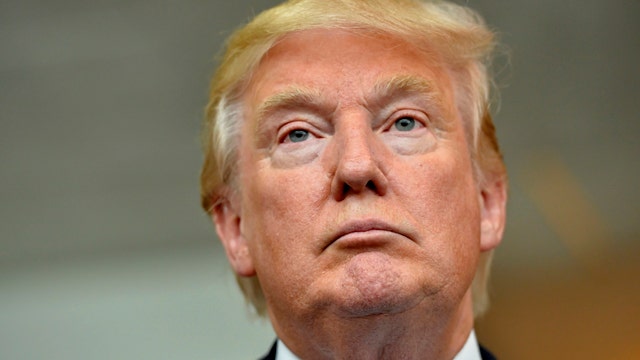It was three years after GOP presidential nominee and Vice President George H.W. Bush said at the 1988 Republican National Convention, "Read my lips, no new taxes," that he paid a price for that pledge.
During his subsequent presidency, Bush had increased some existing (not new) taxes, but when he signed an increase in recording device royalties into law, opponents pounced.
Since then, many other office-holders and office-seekers have paid a price for "flip-flopping." John Kerry for saying, "I actually did vote for the $87 billion, before I voted against it." Mitt Romney for opposing ObamaCare after spearheading “RomneyCare” in Massachusetts. President Obama for making the questionable pledge, "If you like your health care plan, you’ll be able to keep your health care plan."
Yet, Donald Trump now sits high atop the Republican field -- undamaged by numerous apparent "flip-flops." On the subject of abortion, in October of 1999 he told “Meet the Press'” Tim Russert, "I am strongly for choice, and yet I hate the concept of abortion."
Sixteen years later during the Fox News debate on Aug. 6, he said, "I am pro-life ... I hate the concept of abortion. And then since then, I've very much evolved. I am very, very proud to say that I am pro-life."
During his present candidacy, he has said at different times, "I'm using my own money. I'm not using the lobbyists. I'm not using donors. I don't care. I'm really rich." But later, he said: "We have lot of small contributors. I would even take big contributors, as long as they don`t expect anything."
Trump once favored the legalization of drugs. But Colorado's legalization experiment has forced a change in his view.
He once opposed a flat tax proposed by Steve Forbes. Now, he wants a simpler code.
He once supported the privatization of Social Security. Now he doesn't.
Many of his policy shifts are nuanced and reflect the complexity of the issues at hand, but his conservative supporters remain largely forgiving of what -- for other candidates -- would amount to a "gotcha" moment.
"He sounds like you're talking maybe to your uncle, who's cranky, but telling it like it is. People relate to that. He's funny," said the Washington Examiner's Susan Crabtree.
Ramesh Ponnuru, of the American Enterprise Institute, takes a different view. "I think a lot of other conservatives who are supporting him are just not aware of all the liberal positions he's taken over the years. And until somebody spends a lot of money on ads publicizing those positions, they're not going to know about them."
Others say Trump deflects the criticism that would be heaped upon other candidates because he speaks from the cuff in a manner that appeals to grassroots listeners. He rejects the teleprompter and the focus group-tested speech. His loosely phrased, ad-libbed presentations race from subject to subject, delivered in a New Yorky, tough guy, heavy-on-the-hand-gestures manner.
It makes the Monday morning Washington policy wonk analysis difficult, and has pollsters scratching their heads for new formulas to explain his meteoric rise and his staying power.
Trump, himself, explains the flip-flops with the same Teflon ease as the man he points to as a model for political evolution. "I've evolved on many issues over the years. And you know who else has? Ronald Reagan," Trump says.
Reagan was a onetime Democrat and union big-wig, as head of the Screen Actors Guild. He defended his switch to the GOP saying, "I didn't leave the Democratic Party ... the Democratic Party left me."
Reagan's explanation may have been a folksy evolution of similar remarks made by the man who was arguably the greatest statesman of the 20th Century, Winston Churchill. Political enemies hounded Churchill throughout his lengthy career for his shifting policies and party affiliation. Churchill fired back at them, "Some men change their party for the sake of their principles; others their principles for the sake of their party."













































